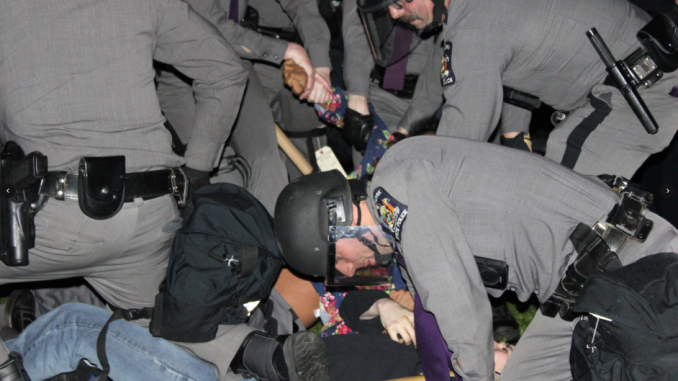
Members of the pro-Palestine encampment who were arrested last spring are suing the school and police for damages.
SUNY New Paltz President Darrell P. Wheeler and Ulster County Sheriff Juan Figueroa are among the names of the defendants listed in a lawsuit over the events of May 2, when 114 police officers dismantled the encampment on Parker Quad and arrested over 130 individuals on charges including trespassing and disorderly conduct.
The event drew condemnation and calls for the charges to be dropped from several academic departments and student organizations, including The Oracle. Almost all of the charges were dropped in June of last year by Ulster County District Attorney Emmanuel Nneji.
The plaintiffs — of which seven are listed on the official complaint — are represented by Michael H. Sussman, a renowned civil rights attorney and constitutional law scholar based out of Goshen, about 30 miles away.
“I think the students had a right to protest peacefully, which I believe they were doing, and I think that the effort to suppress that was content-based, meaning the message they had was not one the university, the state university system or the government of New York was interested in having occurred,” Sussman told The Oracle.
“I think that’s a violation of their First Amendment right to speech and also their right to assemble in public places.”
In the official complaint filed in the Northern District of New York, the plaintiffs allege they were unlawfully arrested, subjected to excessive force and were suppressed by several law enforcement agencies when the encampment was dismantled just a day after its formation.
Both the university and police came to the encampment several times before the removal to request that the encampment remove its tents. When the members complied on May 2, two spokespersons from the university arrived and told the students to disperse by 9 p.m.
When asked what would happen if they didn’t leave, one of the spokespeople responded, “I don’t have an answer for that.”
“There was an agreement made to take down the tents, the agreement was kept, and despite the fact that the agreement was kept thereafter, there was this very significant law enforcement presence which arrested individuals — who were largely on their own campus — for trespassing,” Sussman said.
At 10:30 p.m., officers from the New York State Police and Ulster County Sheriff’s Office began to dismantle the encampment and make arrests. By 1:00 a.m., the police had cleared everyone off Parker Quad.
“The police should not be used as a tool to suppress speech. Those who are putting them in that position are effectively discrediting them and alienating them from those parts of the community that are engaging in that speech. I think that’s what happened here,” Sussman said.
The lawsuit claims that plaintiffs were denied medical treatment, touched inappropriately by police, had their belongings destroyed and listened to officers make jokes about the arrests and encampment, with one officer even saying, “I’ve been waiting all day for this.”
“There needs to be a commitment by those who run the campus not to use the police [this way]. I think that’s important to their credibility,” Sussman said.
“If the police are going to be seen as favoring one or another political faction or those in power, then that will discredit them.”
Sussman has a track record of representing those arrested for peaceful protest. In 2017, he represented several people who engaged in civil disobedience over the construction of a power plant in Wawayanda, including famed actor James Cromwell.
A Harvard Law School graduate, Sussman has argued over 300 cases relating to civil rights and constitutional law. He was Assistant General Counsel of the national office for the NAACP from 1981 to 1986, and a trial attorney for the Civil Rights division of the Department of Justice for four years.
“I’ve been involved in running major demonstrations at West Point against the Iraq War, and before that, I was deeply involved in demonstrating against the Vietnam War, so I’ve had a long history of engagement personally as well as representation of people who are protesting what they believed to be egregious governmental misconduct,” Sussman said.
“I’ve chosen intentionally the kind of work I do … I try to represent people whose interests I think are either underrepresented or misrepresented in the broader society, or people who are engaging in activities that I know are the target of repressive behavior.”
According to Princeton University’s Bridging Divides Initiative, a non-partisan research initiative that tracks political violence in the U.S., at least 1,150 encampment-related demonstrations have taken place at almost 150 colleges and universities across at least 35 states.
Law enforcement engagement has been recorded in over a fifth of all encampment demonstrations, with over 3,000 students having been arrested nationwide.
A New York Times article tracking arrests and detainments connected to pro-Palestine activity on university and college campuses since April 18 found that out of 73 schools, SUNY New Paltz had the fifth highest arrest rate.
When asked for a comment on the lawsuit, Andrew Bruso, a spokesperson for the university said, “The safety of our campus community will always be paramount. We are aware of the lawsuit and intend to defend our position vigorously.”
“The freedom of expression is not a freedom to be taken lightly,” Sussman said. “If [the] government is trying to repress suppressed speech, that becomes itself a crucial issue.”
